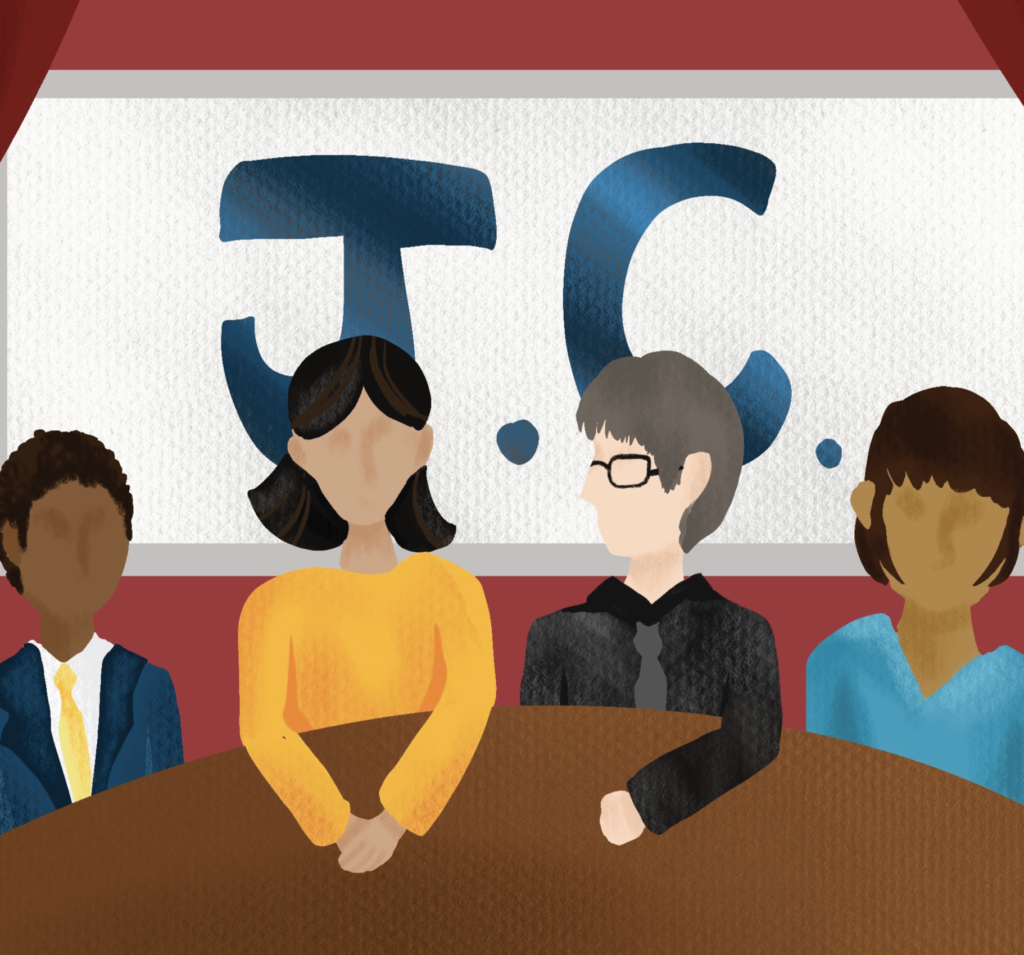
Each time an honor code violation occurs at Choate, a council of elected students — joined by form deans, the faculty adviser, and a faculty observer — gets to question the student and suggest a consequence to the Dean of Students behind closed doors. However, there is an unfixable flaw in this system.
The Judicial Committee (JC) must guarantee privacy for the students who sit in front of it, but they are not held accountable to the students who elect them because the student body doesn’t know how the JC members vote on cases. We can never know if they are fulfilling their duty with impartiality and justice.
The lack of transparency poses an issue because regardless of how fair and objective the students we elect are, they can never separate their judgment from their knowledge of, or past experiences with, the person in front of them. Representatives of the JC could give disproportionate punishments as a result of a bias or an overcompensation for a bias. That’s why every trial in U.S. courtrooms begins with weeding out the judges and jury members who have interacted with the accused in any capacity.
Defenders of the JC cite certain policies that protect students who sit before the comittee. All JC members receive bias training at the beginning of their term, which teaches them how to deal with bias and how to know when they should recuse themselves. They are asked to recuse themselves if there is a large conflict of interest between them and the guilty party, such as a prefect/prefectee relationship or close friends.
However, even if we fully trust JC members to recuse themselves, they are still allowed to vote in the cases of their classmates, teammates, and dorm-mates; hours of bias training don’t stop biases from making their way into decisions.
Moreover, despite stringent efforts to prevent information about the hearings from being shared, it is inevitable that the facts of cases will get out and have a social impact on the person who committed the rule infraction. This does not have to be explicit — it could come out indirectly through a change in attitude toward the person.
This is not a reflection on the JC members or their qualifications for their roles — it is an inevitability that must be accepted when high school students are given juicy information.
Sometimes, this dissemination of information is necessary, such as when a prefect is given privileged information so they can better assist their prefectee. However, when a system involves the sharing of private information in a way that doesn’t benefit the student, it must be abolished.
One may argue that a judicial committee could protect students through more lenient sentences because students are more inclined to empathize with their peers. Students frequently advocate for this in response to “victimless” rule breaks, such as cheating on a test. But, those who argue this perspective ignore that the JC deals with a larger range of issues. When it comes to ruling on bullying and harassment, it would be better to err on the side of stricter consequences. Ultimately, it should be in the best interest of all students to receive fair disciplines rather than lenient ones.
So, the question remains: does the JC give us more fair outcomes? Those who say “yes” may argue that the JC provides a student perspective that would otherwise be lacking in these proceedings. This is true, but it is completely outweighed by the concerns of impartiality and privacy.
The administration has had years of precedent to judge rule breaks because the types of infractions that the JC responds to don’t change year-to-year. The Deans’ Office understands the expected punishments and has little incentive to make absurdly unjust decisions. Therefore, the chance that the student perspective brings us to a more just conclusion is minuscule when compared to the massive potential for bias in the decisions and the leaking of information.
Others say that the more important purpose of the JC is to make students more comfortable with being honest. After all, wouldn’t students be more open if they knew that their understanding peers were the ones reviewing their case rather than adults who are out of touch with their situation? However, the current format of the JC only serves to frighten those who sit in front of them.
Every rule break is met with a tribunal of multiple adults, and even worse — other students. One would be inclined to not tell the truth to avoid being judged by peers. Arguably, those in trouble would feel more comfortable being honest in a room with just their dean — where they don’t fear social repercussions for describing their wrongdoings.
Unless we become members, we’ll likely never know what goes on behind the closed doors of the JC. Nevertheless, we do know the tendencies of people when they have the power and the information to impact their peers’ lives. To preserve justice and privacy, we must abolish the Judicial Committee.


